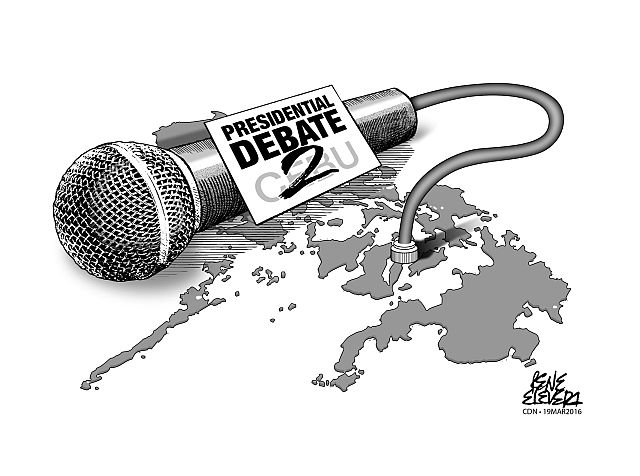
Tomorrow, the second of the three-part PiliPinas presidential debates will be held at the University of the Philippines Cebu campus and while there are complaints, the schedule has been set and it would take a major disruption for organizers and the presidential candidates to back out now.
Again, the viewing public is interested on how the Commission on Elections (Comelec) and the media partners TV-5 and Philippine Star will lay the groundwork for the mechanics of the debate which will hopefully be lengthier not due to commercial breaks but in terms of content.
Since the exchange will mostly be between the moderator, the candidates and the guest panelists and questions will be selected from those submitted beforehand, the public can only hope that the questions raised will be more substantial in order to dig deep into the mind-set of the presidential candidates, who oftentimes speak more out of their prepared bag of researched answers than from what they actually think on the ground.
That probably means giving them more time to answer, not giving them too long that they would drone on and belabor on motherhood campaign statements but not too short that they cannot elaborate on their views and whichever data they may pick out to illustrate their points.
It’s a tricky balancing act and easier said than done, which is why it’s not realistic to expect the candidates to answer everything the public and the guest panelists will throw at them.
That doesn’t stop the public from asking for tougher questions to be posed to the candidates especially questions that probe their track record and policy decisions as public officials.
This is something that Vice President Jejomar Binay, who has been mired by allegations of corruption, and Liberal Party (LP) standard-bearer Mar Roxas, whose service at the Department of Interior and Local Governments (DILG) had been found wanting, should explain to the public.
Environmental groups are said to be converging at the debate venue in a show of force to press candidates on their position concerning environmental issues which was highlighted anew with the visit and the designation by former US vice president Al Gore of the Philippine climate change “warriors” or advocates.
We hope that the candidates be grilled about their programs on the environment—Roxas on whether he will continue the Aquino administration’s thrust on coal-fired plants—as well as issues that concern Cebu like the ongoing traffic congestion and development of the countryside.
Whatever happens, we hope this second presidential debate will be a lot more substantial and informative and that candidates set aside their mutual animosity or admiration for each other to elaborate anew on their vision and programs on how to achieve progress and good governance and not just sell themselves to the public.